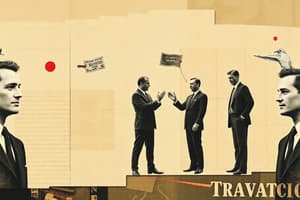Podcast
Questions and Answers
Which of the following is a core element of transactional leadership?
Which of the following is a core element of transactional leadership?
- Motivating employees through rewards and punishments for achieving set goals (correct)
- Encouraging followers to challenge the status quo and innovate
- Focus on inspiring followers with a vision
- Providing individualized attention and support to each follower
What is a fundamental distinction between transformational and transactional leadership?
What is a fundamental distinction between transformational and transactional leadership?
- Transactional leadership requires a high level of emotional intelligence in leaders, while transformational leadership requires industry knowledge.
- Transformational leadership concentrates on inspiring and developing followers, while transactional leadership relies on rewards and control. (correct)
- Transformational leadership assumes that the needs of the leader and followers are identical, whereas transactional leadership does not.
- Transactional leadership focuses on leading by example rather than motivation.
Which of these is considered a key category within transformational leadership?
Which of these is considered a key category within transformational leadership?
- Contingent Reward
- Active Monitoring
- Intellectual Stimulation (correct)
- Management by Exception
In transactional leadership, how is motivation primarily achieved?
In transactional leadership, how is motivation primarily achieved?
Which leadership style is MOST likely to prioritize employee development and innovation?
Which leadership style is MOST likely to prioritize employee development and innovation?
A sales manager who gives his team a bonus for every 10 sales made is exhibiting which kind of leadership?
A sales manager who gives his team a bonus for every 10 sales made is exhibiting which kind of leadership?
If a leader focuses on inspiring his team and developing their potential, he would be employing which style?
If a leader focuses on inspiring his team and developing their potential, he would be employing which style?
Which theory relies on the idea that the leader's desires and the follower's desires are not the same?
Which theory relies on the idea that the leader's desires and the follower's desires are not the same?
Which leadership style is characterized by setting aggressive goals and standards for each employee?
Which leadership style is characterized by setting aggressive goals and standards for each employee?
According to the situational theories of leadership, what should a leader do in different circumstances?
According to the situational theories of leadership, what should a leader do in different circumstances?
Which of the following leadership styles emphasizes praise and encouragement while avoiding criticism?
Which of the following leadership styles emphasizes praise and encouragement while avoiding criticism?
What type of leadership style does Ginni Rometty employ, according to the provided information?
What type of leadership style does Ginni Rometty employ, according to the provided information?
Which style of leadership most aligns with a task-centered approach?
Which style of leadership most aligns with a task-centered approach?
What was a key initiative implemented by Rosalind Brewer at Sam's Club?
What was a key initiative implemented by Rosalind Brewer at Sam's Club?
What is a primary focus of coaching leadership?
What is a primary focus of coaching leadership?
Which leadership style, according to Goleman's model, demands immediate compliance?
Which leadership style, according to Goleman's model, demands immediate compliance?
Which of the following best describes Warren Buffett as a leader?
Which of the following best describes Warren Buffett as a leader?
What is a common principle underlying all leadership theories discussed?
What is a common principle underlying all leadership theories discussed?
Which of the following best describes the primary focus of management, as opposed to leadership?
Which of the following best describes the primary focus of management, as opposed to leadership?
An individual who holds a formal position of authority, but struggles to provide direction, exemplifies what type of leadership?
An individual who holds a formal position of authority, but struggles to provide direction, exemplifies what type of leadership?
Which of the following is considered a key trait of an effective leader?
Which of the following is considered a key trait of an effective leader?
What distinguishes employee-centered leadership from task-centered leadership?
What distinguishes employee-centered leadership from task-centered leadership?
A leader who involves the team in making decisions is practicing which type of leadership style?
A leader who involves the team in making decisions is practicing which type of leadership style?
Which of the following best represents a leader with a Laissez-faire style?
Which of the following best represents a leader with a Laissez-faire style?
What is a key difference between formal and informal leadership?
What is a key difference between formal and informal leadership?
Which leadership trait helps a leader gain trust and confidence of their followers?
Which leadership trait helps a leader gain trust and confidence of their followers?
A task-centered leader is most likely to focus on which of the following?
A task-centered leader is most likely to focus on which of the following?
An effective leader is LEAST likely to display which of the following characteristics?
An effective leader is LEAST likely to display which of the following characteristics?
Flashcards
Leadership
Leadership
The act of influencing others to follow a specific direction and vision.
Management
Management
The management of all the complicated details involved in running a business effectively.
Formal Leadership
Formal Leadership
An official position with the responsibility to provide leadership.
Informal Leadership
Informal Leadership
Signup and view all the flashcards
Task-Centered Leadership
Task-Centered Leadership
Signup and view all the flashcards
Employee-Centered Leadership
Employee-Centered Leadership
Signup and view all the flashcards
Autocratic Leadership
Autocratic Leadership
Signup and view all the flashcards
Democratic Leadership
Democratic Leadership
Signup and view all the flashcards
Laissez-faire Leadership
Laissez-faire Leadership
Signup and view all the flashcards
Emotional Intelligence
Emotional Intelligence
Signup and view all the flashcards
Situational Leadership
Situational Leadership
Signup and view all the flashcards
Goleman's Model of Situational Leadership
Goleman's Model of Situational Leadership
Signup and view all the flashcards
Pacesetting Leadership
Pacesetting Leadership
Signup and view all the flashcards
Authoritative Leadership
Authoritative Leadership
Signup and view all the flashcards
Transformational Leadership
Transformational Leadership
Signup and view all the flashcards
Transactional Leadership
Transactional Leadership
Signup and view all the flashcards
Idealized Influence
Idealized Influence
Signup and view all the flashcards
Inspirational Motivation
Inspirational Motivation
Signup and view all the flashcards
Intellectual Stimulation
Intellectual Stimulation
Signup and view all the flashcards
Individualized Consideration
Individualized Consideration
Signup and view all the flashcards
Transformational vs. Transactional Leadership
Transformational vs. Transactional Leadership
Signup and view all the flashcards
Study Notes
Principles of Management: Leadership
- Leadership is about direction and influencing others, while management focuses on administering complex details of operations.
- The two often overlap.
- Leadership traits include: drive, desire to lead, honesty/integrity, self-esteem/confidence, open-mindedness, intelligence, and extraversion.
- Not all effective leaders are extroverts.
Formal vs. Informal Leadership
- Formal leadership comes from assigned positions of authority.
- Informal leadership comes from individuals without formal titles who exhibit leadership qualities and inspire a vision.
- People in formal positions may not always be strong leaders.
Effective vs. Poor Leadership
- Effective leadership is about real-world examples and actions.
- Poor leadership is also important to study to contrast with the positive examples.
- Various traits and styles will be analyzed in detail.
Effective Leadership Examples
- Warren Buffett, Berkshire Hathaway: known for identifying successful companies, presenting a strong vision, and inspiring others.
- Rosalind Brewer, Starbucks: the first female and African American COO at Starbucks, known for forward-thinking initiatives and leadership style
- Ginni Rometty, IBM: showcased a democratic, soft-spoken leadership style that enabled success.
Situational Theories of Leadership
- Situational theories of leadership assume the most effective style changes with the situation.
- Leaders must adapt their approach to different circumstances.
- Not all leadership is the same for all industries.
- Goleman's Model identifies various styles of leadership (e.g., pacesetting, authoritative, affiliative, coaching, democratic, coercive) that can be used to react to the situational components.
Transformational and Transactional Theories of Leadership
- Transformational leadership inspires followers, assuming that the leader and follower’s desires match. It has four categories: idealized influence, inspirational motivation, intellectual stimulation, and individualized consideration.
- Transactional leadership focuses on motivating employees through rewards for accomplishing goals. Motivation is derived from an arrangement of rewards.
Practice Questions
- Autocratic leadership is best for task-centered leadership.
Learning Outcomes
- Differentiate between leadership and management
- Identify traits, dimensions, and styles of effective leaders.
- Compare examples of effective and poor leadership.
- Summarize situational theories of leadership.
- Summarize transformational and transactional theories of leadership.
Studying That Suits You
Use AI to generate personalized quizzes and flashcards to suit your learning preferences.




